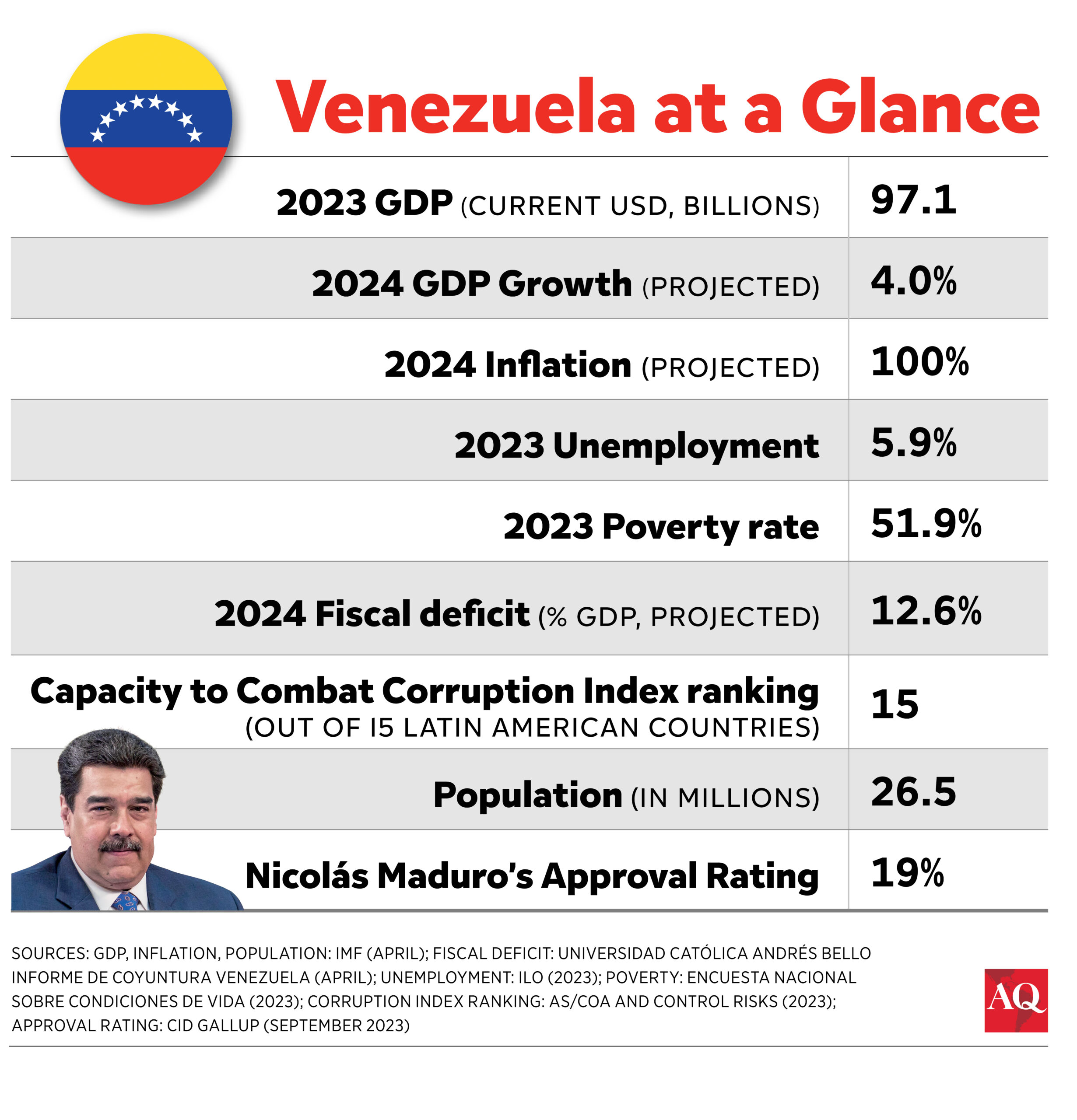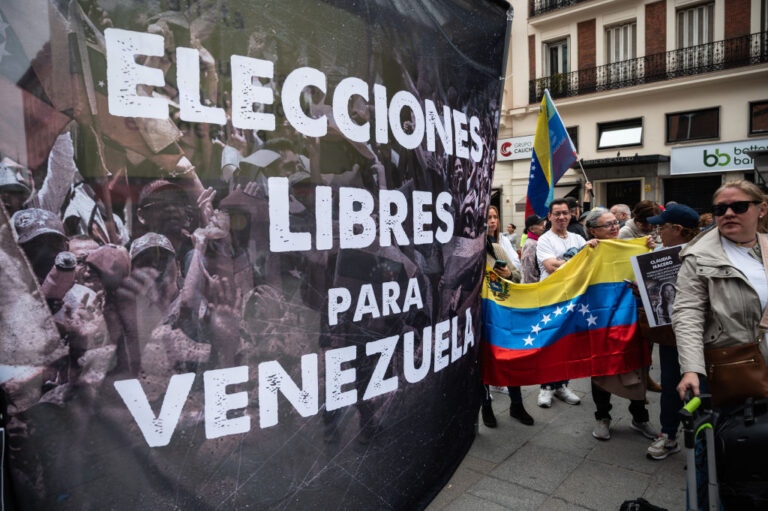CARACAS — After 11 years of bitter rule by Nicolás Maduro, Venezuela will hold its most important presidential election on July 28, a rare opportunity for the country to enter a cycle of reinstitutionalization and democratization, and one that could lead the oil-rich nation into an era of economic recovery, stability and the return of many of its citizens.
Electoral results that all political actors recognize as legitimate are therefore the only constitutional path currently available to restore the rule of law, address the humanitarian crisis, and lift some of the international sanctions imposed on the regime in recent years. In theory, fair, transparent, and competitive elections would also help spur economic growth, encouraging more private investment in the country’s once-thriving oil sector, and ultimately bolstering essential public services that are currently in shambles.
But in Venezuela, the situation is less clear because the political system is winner-take-all. There are no guarantees for anyone who loses, so the incentives to hold free and fair elections are close to zero right now. At best, the country will have semi-competitive elections.
Most polls show a majority of voters are ready to punish. Chavism Even though the front-runner, Edmundo González Urrutia, is an unknown 74-year-old retired diplomat who considers himself a contingent candidate, by voting in favor of the opposition, González Urrutia was nominated unanimously by a broad coalition of opposition parties. González Urrutia’s nomination came after several candidates, including María Corina Machado, who won last October’s primary and is running his campaign nationwide, had previously been undemocratically denied entry to the vote.
As the election campaign progresses, political uncertainty is growing for both groups, with neither knowing what will happen politically in the days leading up to and after the presidential vote. The opposition fears that their candidates and their umbrella parties (MUDs) could face new bans or the date of the vote could be suddenly changed at any point before the election. Chavism, On the other hand, there is a fear that an electoral defeat could lead to brutal political persecution.

As things stand, the presidential election continues to reflect an existential conflict between the two camps, one in which there is only one winner and a few losers, and losing without a robustly negotiated and settled deal in advance represents a negligible cost and risk.
Unless these conditions change, the election results will be highly unstable and will lack the legitimacy and power to drive the process of institutional reform and democratization. ChavismIf the opposition loses the election by a large margin, as most polls suggest, some fear that they could use the electoral opportunity to engineer a rapid transition of power, which could be used in the judiciary to punish the opposition at home and abroad for a range of crimes, including human rights violations, illegal activities and widespread corruption.
Concerns about the future
The United States has already issued several open and closed indictments related to these allegations. In early March, the International Court of Justice (ICJ) authorized a full investigation into human rights violations in the country, and in April President Maduro allowed the ICJ to open an office in the country to conduct its investigation – a step forward.
Moreover, the United States has indicated its intention to review and potentially reverse some of these indictments and individual sanctions. However, given the seriousness of these threats, Chavism They may be prepared to use their strong control over state institutions to limit, block or postpone any political change.
In contrast, according to many pollsters, if the opposition party loses the presidential election, they could disappear from the political scene altogether, no matter how unlikely this scenario seems today. Chavism They hold an overwhelming majority in Congress, have direct influence over the judiciary and the military, and control most of the country’s governors and city halls. A return from exile would likely be impossible for opposition forces already facing politically motivated judicial action in Venezuela, where more than 270 political prisoners are still awaiting release.
To make matters worse, Chavism Democrats believe that if they can use their crony networks and relative strength in rural areas to close double-digit polling gaps and pull off a comeback victory to win the presidential election, the opposition could challenge the victory or even allege fraud.
Venezuela’s Political Trap
Colombian President Gustavo Petro stressed the need to find a solution to break this political trap, highlighting the benefits Venezuela could gain from this effort, inspired by Colombia’s National Front pact of the late 1950s, in which both winning and losing groups agreed to alternate power.
Moreover, Petro highlighted the most recent peace agreement with the FARC, negotiated in Havana, as a potential model, which addressed human rights violations through a complex judicial framework to address social grievances and restore individual rights.
The Colombian president correctly noted that Venezuela needs to have difficult conversations about judicial and institutional guarantees that would mitigate the costs and risks of losing power. Whether the Colombian example is instructive is another matter. The Petro solution hints at a broader negotiated settlement between Venezuela and Colombia. Chavism And the opposition party.
Political guarantee
So far, Norway-brokered talks between Mexico and Barbados have collapsed and focused on free and fair elections and the lifting of international sanctions against Venezuela, but Venezuela urgently needs to move towards a more comprehensive framework of judicial guarantees and institutional reforms.
Petro also suggests that a referendum on this type of initiative should be held at the same time as the presidential elections, which would pave the way for the necessary discussions to take place after the country has finished its electoral campaigns. Indeed, González Urrutia supports discussing amnesty after the vote, and Maduro has said that peace needs to be brought about once his third term is confirmed. Privately, the initiative seems to be welcomed by all parties, but no one wants to talk about it publicly before the elections, because it would make them appear too weak or not strong enough.
But without committing to the relevant issues before the vote and setting some rules of engagement, all these promises are not credible. Petro’s warning seems well founded. The problem in Venezuela is that there is no consensus-building mechanism or public platform for political actors to discuss these issues and ensure a peaceful and stable process of political change.
Without these mutual guarantees, Venezuela’s path to reinstitutionalization and democratization will remain difficult at best. More than 25 years later, Chavism The ruling and opposition parties remain locked in an existential conflict for power that will remain socially corrupt and politically destructive unless judicial guarantees and fundamental institutional reforms are implemented. If the country proves unable to overcome this trap, it will be unable to move forward. The July 28 presidential elections are an opportunity for the political change that most people want and deserve.
tag: Chavismo, elections, Venezuela, Venezuelan opposition
The opinions expressed in this article are not necessarily those of American Quarter Or its publisher.

